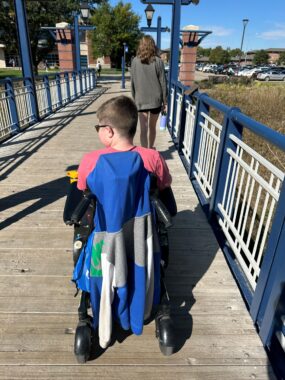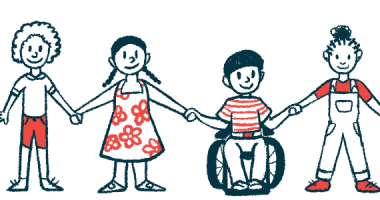How Duchenne deters dreams about the future
Looking too far ahead is a luxury we haven't allowed ourselves — to a fault
by |

I drove my oldest son, Max, who is 17, to his second college visit this week. As we veered onto the interstate, I told him I knew someone his age who’d already decided to attend the school we were about to visit.
He was surprised. “Already?” he said. “How do people decide so early?”
I was idly chatting and not thinking too much about my words. I told Max that some kids decide early because they had a sports scholarship, as in the case of some friends we knew, while others make an early choice because they’ve always dreamed of attending a particular college.
As I looked over my shoulder and then into the rearview mirror before getting in the passing lane, he responded softly, “I guess I could never dream about the future. It must be different for people without disease.”
Max has Duchenne muscular dystrophy (DMD), a progressive, fatal disease without a cure. All I could say was, “Yeah, Duchenne makes it tricky to dream.”
I’ve often had trouble dreaming about Max’s future as well. I didn’t know if he’d be healthy enough to attend college, or even be alive. Life with DMD has turned into a one-day-at-time journey, and thinking ahead a year or two can be scary. It’s caused me to contemplate things I’d rather not, and hope they never come true.
We haven’t talked much about Max’s future over the years. But by avoiding dreaming of the future, I also ignored Max’s feelings. A long time ago, when he was experiencing intense anxiety, some of it was because he was scared of the future; we learned not to get too far ahead of ourselves because it invoked anxious thoughts.
Is it time to dream?
I walked behind Max during much of his college visit, thinking about his words, “I guess I could never dream about the future.”
Max has had two college visits, and I’ve teared up during both of them. Max’s words made me realize why. The entire college decision has me charged full of emotions.

Max Vertin tours a college campus recently. (Photo by Betty Vertin)
I feel overwhelmed. At the beginning of my life as a DMD mom, someone told me he’d need help with all his daily activities and would die before he was 20. But here I am, over 10 years later, helping him choose a college where he’ll turn 20.
It makes my eyes water to type that. I’m incredibly proud of Max and our family for getting to this point.
I feel hopeful. Yet hope is dangerous in the DMD world. Duchenne slowly robs our sons and families. We get used to losing. To hope when we’ve lost so much sometimes feels like we’re setting ourselves up for failure. But here, on the front steps of college, little flecks of ignored hope are shimmering.
Yet I still feel scared. What if something happens before this dream comes to fruition? What kind of heartbreak will we experience if this doesn’t pan out?
As much as I’ve raised him to advocate for himself, I’ve always been in a safe proximity to help. He might still need me, but this time, I’ll have to let him navigate it as an adult.
There are so many emotions. I’ve tried to compare this experience with when my oldest daughter, Lexi, prepared for college, or with my son Chance, who is just a year younger than Max and is already talking to college coaches and preparing to make his decisions at a younger age.
Each child comes with a separate set of needs, and my heart has a different set of strings for each of my children. For Lexi and Chance, I’m excited to see their dreams come true. And that’s where Max’s situation hits differently: He hasn’t allowed himself to dream.
That’s a reality of Duchenne muscular dystrophy that I’ve ignored until now. It’s a heaviness that doesn’t break my heart, but works like a submerged anchor in the darkness of Duchenne.
I hate that Max didn’t dream as freely as he should have. Perhaps I should’ve fostered those dreams, but I was too scared.
I have two other sons with DMD: Rowen, 14, and Charlie, 12. I hope I’m learning to be braver for them, so I can help them feel OK when they dream about their future.
Note: Muscular Dystrophy News Today is strictly a news and information website about the disease. It does not provide medical advice, diagnosis, or treatment. This content is not intended to be a substitute for professional medical advice, diagnosis, or treatment. Always seek the advice of your physician or another qualified health provider with any questions you may have regarding a medical condition. Never disregard professional medical advice or delay in seeking it because of something you have read on this website. The opinions expressed in this column are not those of Muscular Dystrophy News or its parent company, Bionews, and are intended to spark discussion about issues pertaining to muscular dystrophy.









Comments